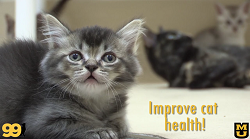 |
| A screenshot from the 99 Lives Project video--Courtesy of the University of Missouri |
The feline genetics laboratory at the University of Missouri's veterinary college has set an ambitious goal to sequence the genomes of 99 cats. Leslie Lyons, professor emeritus and principal investigator, hopes the genetic information gathered during the project will help veterinarians, breeders, and cat owners eliminate some genetic diseases.
Problem is, it costs about $7,000 to sequence each cat. So Lyons and her colleagues have taken to the Internet to crowdfund the project, called 99 Lives. Her lab is educating the public about it on Facebook and even posting a video that has garnered more than 56,000 views so far.
Lyons' lab is studying two inherited diseases that cause feline blindness: one that affects Persian cats and the other that occurs in Bengal cats. "Once we identify the DNA variants in the cat genome that cause these diseases, we will be able to develop genetic tests," which breeders and owners can use to breed out the bad genes, Lyons says in the video.
Cats suffer from many of the same diseases that affect humans, such as asthma, diabetes, and obesity. Lyons explains in the video. Her lab also has research projects underway in dwarfism and neurological disorders such as spasticity and neuropathic pain.
What's learned during the feline sequencing project could provide valuable insight into several diseases that affect both pets and people, as many of the 21,000 genes found in the cat genome are similar to human genes. Lyons is also hopeful that as the cost of genetic testing continues to come down, genome sequencing of cats will become a normal part of veterinary care, just as it has in human healthcare.
The 99 Lives initiative is one of several genomics projects underway in animals that could be relevant to human health. Late last year, for example, scientists at the University of Washington in Seattle and the Broad Institute of Harvard and the Massachusetts Institute of Technology sequenced the ferret genome, then used it to map changes in gene expression that occur in lung diseases affecting both people and ferrets.
In addition to funding, Lyons' lab is seeking pet owners willing to volunteer their cats--even those that don't suffer from genetic diseases--to be sequenced. Lyons is also reaching out to breed groups all over the world, in the hopes that they will nominate cats for the project.
- watch a video about the 99 Lives project here
- read more about the science behind the project at the lab's website